Fly Pest Control in Lancaster and York
At Dominion Pest Control, we understand how troublesome flies can be. That’s why we provide the best and most effective fly pest control services in the area. Our trained exterminators have over 100+ combined years of experience and serve both residential and business customers in Lancaster and York, PA. Read on to learn how we can help you get rid of flies long-term, including the methods we use to get rid of them completely naturally.
Do Flies Multiply Inside the House?
Flies can rapidly multiply in the home if left unchecked. In fact, the lifespan of a fly can be as short as 10 days, and during that time they can lay hundreds of eggs. These eggs hatch into larvae and then into adult flies, making it possible for one female fly to produce up to 2,000 offspring in just a few weeks! This is why it is important to take steps to control flies as soon as they are spotted in the home.
Are Flies Dangerous?
Flies are more than just an annoyance; they can also be dangerous. Flies have the potential to spread a variety of diseases, such as salmonella, E. coli, and dysentery. They also carry bacteria and viruses on their legs and mouths that can contaminate food and surfaces. In addition, flies can trigger asthma attacks in some people due to the dust and allergens they bring with them when they enter homes.
Some species are also capable of laying eggs in human skin wounds or in body cavities—a condition known as myiasis. This can cause serious infections if not treated immediately. Some fly species even bite humans, causing redness, swelling, and irritation of the skin.
For these reasons, it’s important to take steps to eradicate fly infestations in your home or business. By using effective fly pest control services from Dominion Pest Control, you can get rid of them quickly and completely while preventing future infestations.
Types of Flies in Your Home
The first step in eliminating your fly problem is to identify the type of fly in your home. Below are some of the most common local fly species:
Fruit flies are tiny, about 1/8 of an inch long, and have red eyes. Their tan bodies are striped with dark bands and they have clear wings. These flies typically reside near ripened fruits and vegetables and breed in drains or garbage disposals.
Houseflies are slightly larger than fruit flies, about 5/16 of an inch long. They have greyish-black bodies, four black stripes on the thorax, and grayish wings. Houseflies breed in decaying materials like garbage or compost piles and often feed on human food.
Cluster flies are slightly larger than houseflies measuring up to 1/2 of an inch long. They have a dull black color with slightly darker markings on their backs which distinguishes them from regular houseflies. Unlike other fly species, cluster flies spend most of their time outdoors in sheltered areas such as attics or garages. They are attracted to areas with warm temperatures during late summer months as they look for places to overwinter until springtime when they become active once again.
Drain flies are small, moth-like insects that measure up to 2/5 of an inch in length. They have a fuzzy appearance due to their mottled light and dark gray hairs on their bodies and wings. Drain flies breed in moist areas such as drain pipes or shower heads, hence their name.
Blowflies are metallic blue or green with short legs and broad abdomens measuring up to 3/4 of an inch long. Blowflies generally prefer outdoor areas and are often found around compost piles, garbage cans, and pet areas. However, they can enter homes through windows or doors seeking rotting food to lay eggs in.
Stable flies are medium-sized insects that measure up to 5/8 of an inch long with dark gray bodies and yellow legs and antennae. They have piercing mouth parts that allow them to bite humans and animals alike in search of blood meals while feeding on plant nectar during non-biting times. Stable flies often reside near decaying organic material like compost or manure piles where they can lay eggs and breed; however, they can also be found indoors around pet areas or windowsills looking for food or shelter from wind and rain.
Face flies are similar in size to stable flies but have silver patches on their backs instead of yellow markings like stable flies do; these patches help distinguish the two species apart from one another. Face flies feed primarily on secretions produced by animals such as tears or saliva which makes them more commonly found outdoors near livestock such as horses, cattle, sheep, etc., rather than inside homes looking for food sources like other types of flies might do so.
Using Insecticides for Fly Control
Once you identify the type of fly and its habitat, you can work on removing it from your home. The most obvious fly control solution is to apply insecticide. Insecticides are an effective way to get rid of flies and their larvae, but should be used with caution. Chemical insecticides contain pyrethroids, organophosphates, or other active ingredients that target certain species of flies. These products can be applied in a variety of ways, including liquid sprays, aerosols, foggers, dusts, and baits.
Sprays are typically used as a spot treatment for treating areas where the pests have been seen while foggers and fumigants are more appropriate for larger infestations. Dusts are great for getting into cracks and crevices or other hard-to-reach places where flies may be hiding out. Baits allow you to attract adult flies with food attractants while also containing an insecticide that will kill off the adults and prevent reproduction.
When using any type of insecticide, it’s important to read the product label carefully to ensure proper handling and application techniques. It’s also important to wear protective gear such as long sleeves, pants, gloves, eye protection, and a mask when applying any type of chemical solution to your environment as this can help protect against any potential health risks associated with exposure. Lastly, any residual material should be thoroughly cleaned up.
If your fly problem requires insecticides, it’s best to call a professional like Dominion Pest Control. Our pest control experts know exactly what type of insecticide to apply and where to apply it. Furthermore, we can do so safely and effectively.
How to Get Rid of Flies Naturally
Install Screens on Windows and Doors
For a short-term or smaller fly problem, you can try a DIY method to get rid of flies naturally. A common option is to install screens on all windows and doors. This won’t help you to remove existing flies in your home, but will help to prevent additional flies from entering.
Use Sticky Traps
Another option is to use traps, such as sticky traps. These devices attract flies to their adhesive surfaces with a combination of light and carbon dioxide.
Spray Essential Oils
Essential oils are another way to eliminate flies from your household temporarily. Citronella, lemongrass, lavender, peppermint, tea tree oil, and eucalyptus have all been used successfully for controlling fly populations indoors. Like garlic, flies are repelled by their scent and tend to stay away from the treated areas.
Use a Soap and Vinegar Solution
You can also try creating a mixture of equal parts liquid dish soap and white vinegar and spray it around your home or business. The solution works by coating the wings of the flies, making it difficult for them to fly and therefore reducing their impact on your home environment.
Grow Repelling Plants
Additionally, certain plants such as marigolds or basil can be planted around the outside perimeter of your home or business. Due to their distinctive smells, these plants act as natural fly repellents.
Use Fly Predators or DE
Other natural fly control solutions include using fly predators (tiny parasitic wasps that feed on pest larvae) or using food grade diatomaceous earth in moist areas where flies like to breed and lay eggs.
Call a Natural Pest Control Expert
While DIY natural fly treatments can be helpful as temporary solutions, it’s important to note that they may not provide immediate or long-lasting results. At Dominion Pest Control, we use professional grade Nature-Cide All Purpose Concentrate to get rid of flies long-term. This powerful commercial blend kills not only flies, but also ants, bed bugs, cockroaches, fleas, mosquitoes, ticks, and other insects on contact. As a bonus, our solution is formulated with clove oil, cottonseed oil, and other natural ingredients – so you won’t have to worry about health risks to your family or pets.
Fly Prevention
When it comes to controlling these household pests, prevention is key. It’s important to keep food sealed or stored away properly, clean up any spills immediately, empty garbage cans often, and make sure all windows and doors are sealed tightly.
Complete and Lasting Fly Pest Control
For the most thorough and lasting fly removal in your home, contact Dominion Pest Control. We use effective solutions to help you get rid of all types of flies found in Lancaster and York Counties. We provide comprehensive fly pest control services that are tailored to each unique situation. In addition, we offer regular pest control packages that not only help to eliminate existing fly populations, but also prevent future infestations.
Our technicians are skilled in identifying the species of fly as well as any potential entry points, food sources, harborage areas, and other factors that could be contributing to the fly problem.
At Dominion, we are experienced in the most advanced techniques for proper fly extermination. This includes sanitation practices like removing any potential food sources such as unrefrigerated fruits and vegetables, spilled liquids or food debris, pet waste, etc. that might attract these insects. We can also physically remove fly larvae and pupae with a vacuum or other tools. Through habitat modification, we can close entryways to your home and change where the flies reside long-term. When the situation requires, we may also set traps, use chemicals, or use natural insecticides like Nature-Cide.
Call us today at (717) 393-7879 or contact us here for more information about our fly control services. We look forward to serving you soon!
We serve Lancaster County (Lititz, Lancaster city, Manheim, Ephrata, Strasburg, etc), York County (Dallastown, Red Lion, York city, Hellam, etc), Lebanon, and Hershey. Here’s a map of our location and service area:

